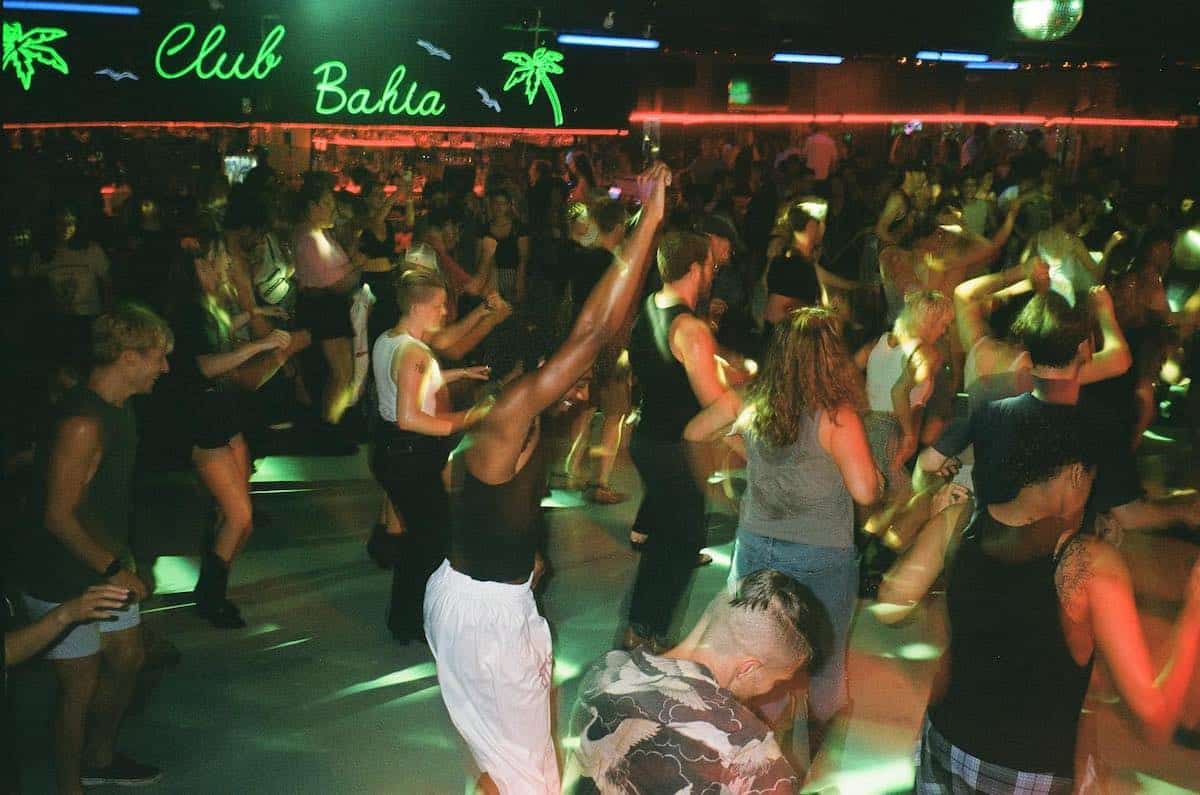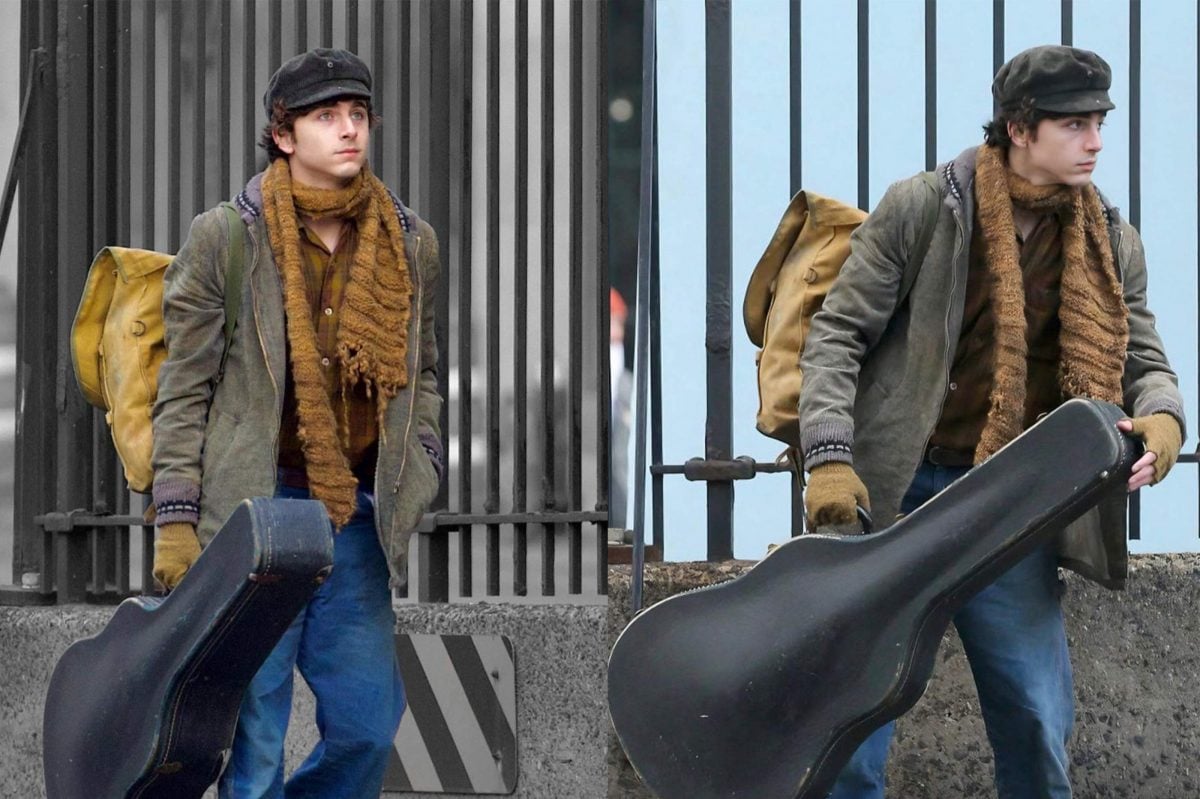
It’s 10:30pm on Thursday night in East Los Angeles and a dimly lit lino dancefloor in Echo Park is full of 20 and 30-somethings, standing in lines. Above them are disco balls. On multiple feet, are cowboy boots. Everyone is hot. Both in looks and quite literally, sweating. The music has been moving from Britney Spears and Caroline Polachek through to traditional country western songs. But right now, all attention is focused firmly on the woman on the stage wearing jeans, a crop top and a headset microphone as she counts out steps. “This one is kind of hard because it starts on the ‘and’ count,” she says, before launching into her lesson. “Heel, toe, hip, hip, hip,” she demonstrates, accentuating the movement of her hips from side to side. Hip, hip, hip. “You can really give this one some ‘oomph’ if you want to.”
Once enough people seem to have picked up the dance, the music begins. Most of us fumble and miss a beat (or 10), but even so, when you hit one at the right time, surrounded by others doing the same move, it’s elating. Everyone claps at the end, a few people exchange sheepish smiles with their neighbour, and one person shoves a fist of success in the air.
The room is packed: people who aren’t on the lino floor in the middle are either loitering nearby watching people’s footwork closely, too nervous to commit fully yet, or drinking at the bar and tables that fill the rest of Club Bahia, a Latin nightclub on Sunset Boulevard that's offered live music and salsa for over four decades, and, since last October, has been the home of Stud Country, a queer line-dancing night founded in 2021 by best friends, Sean Monaghan and Bailey Salisbury.
View this post on Instagram
The idea for Stud Country came about when Oil Can Harry’s — an iconic Studio City gay dive bar that hosted line-dancing — shut for the pandemic, and then permanently, after 50 years in business. Left without anywhere to line dance, and missing the community the events provided, the duo took matters into their own hands. Initially, through Zoom dance tutorials, then taking over car parks, before Stud Country found its home at Club Bahia. At first, taking place on Monday nights, the event's popularity meant it eventually expanded to Thursdays, too. There's a regular weekly night in San Francisco, where Salisbury now lives, a Spring Formal in May, a Goth Ball in October, and, earlier this year, there was even a sold-out pop-up in Manhattan, New York.
The history of line dancing – a choreographed dance in which a group of people repeat a sequence of steps while arranged in one or more lines or rows – is extensive, though there is debate as to its origins. Some believe it can be traced back to the round and square dances of Europe – arriving in the USA with the settlers who immigrated to America in the 1800s. Others say it originated with 19th-century social settlement movement folk dancing. Whatever you believe about its history, initially, line dancing wasn’t something synonymous with the queer community. But that began to change in the 1980s and eventually, within certain circles, the dance overtook disco in popularity. The International Association of Gay/Lesbian Country Western Dance Clubs was founded in 1993 and in New York, Big Apple Ranch, a country-western dance class taught on the second Saturday of every month, has been going since 1997.
View this post on Instagram
Stud Country began as a community-minded project — and still, among the young, many of its regulars are people who frequented the dancefloor at Oil Can Harrys' for decades: Anthony Ivancich, a pillar of the Stud Country community who has been country western dancing since the 1970s often gives dance tutorial workshops. But like all good things today, thanks to social media, the secret didn't stay a secret for long. In a recent Instagram video, singer Renee Rapp publicly proclaimed Stud Country to be one of her favourite nights out in the city, and Kendall Jenner's friends documented the night on their Stories. A video showing a group twisting and turning that was uploaded to TikTok has been viewed over 86,000 times.
The event's rise in popularity means it can be hard to find a spot on the dancefloor today, and beginners likely won't get as much of a view of the instructors' footwork as they'd like. But it also means Stud Country is as much a party as it is a dance class. And, given it's frequented by queers and allies, perhaps somewhere other than Hinge to meet a potential crush. Certainly to meet new friends and community in a typically isolating city like L.A. where you can go days without bumping into another human if it wasn't for missing a beat here.
Troye Sivan’s popular song Rush begins and the beginners move out of the way to let the regulars take their positions. "You've got my heartbeat racin', my body blazin'," the Australian pop star sings as the dancers move perfectly in unison. In front of me, they turn, kick their right foot to the front, then to the side, and clap their hands in the air at the beat, before Sivan launches into the chorus. "I feel the rush, addicted to your touch." They turn, they kick, they cheer.



